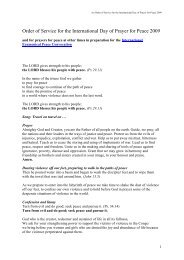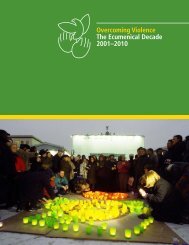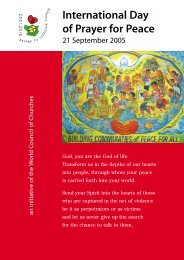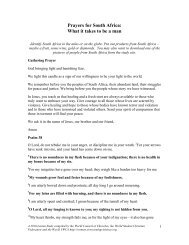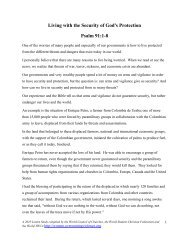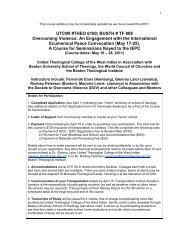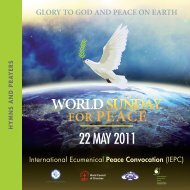Alternative Globalization Addressing Peoples and Earth
Alternative Globalization Addressing Peoples and Earth
Alternative Globalization Addressing Peoples and Earth
You also want an ePaper? Increase the reach of your titles
YUMPU automatically turns print PDFs into web optimized ePapers that Google loves.
50<br />
sharing <strong>and</strong> caring; celebrating life over material wealth; communal<br />
ownership of resource bases <strong>and</strong> high levels of intra-community<br />
interaction <strong>and</strong> solidarity… The Pacific Churches see the ‘Isl<strong>and</strong> of<br />
Hope’ as fitting expression of the global, ecumenical concept of the<br />
Kingdom of God in the Pacific context… The best of our traditional<br />
values are like seeds of the kingdom of God which, as Christians, we<br />
can offer to the world.” 21<br />
A youth consultation on economic globalization held just before the<br />
global conference concluded that “ Never before has it been so important<br />
for young people to search for alternatives to the current dynamic of<br />
globalization. It is our future that is being threatened.” 22<br />
Churches in Western Europe: economy in the service of life, June 15-<br />
19, 2002, Soesterberg, Netherl<strong>and</strong>s<br />
The Soesterberg consultation on “The economy in the service of life” was<br />
jointly called by the WCC, the Lutheran World Federation, the World<br />
Alliance of Reformed Churches <strong>and</strong> the Conference of European Churches,<br />
<strong>and</strong> was hosted by the Dutch Council of Churches. The consultation<br />
analyzed how globalization <strong>and</strong>, specifically, the role of money affects<br />
European societies, <strong>and</strong> the questions <strong>and</strong> challenges that could pose for<br />
churches. It drafted a response from Western European churches to<br />
questions raised by churches in the South <strong>and</strong> the East at previous<br />
consultations. A letter from Soesterberg to the churches in Western Europe<br />
contains an explicit critique of economic globalization: “The gospel<br />
promises life in all its fullness for all people <strong>and</strong> the whole creation (John<br />
10:10). This promise was incarnated in Jesus Christ. Nobody is excluded<br />
from God’s household of life. The Christian community reflects this vision<br />
for the sake of the whole world. Guided by this vision, we strive for an<br />
economy in the service of life. Market <strong>and</strong> money should enable the<br />
exchange of goods in order to satisfy human needs <strong>and</strong> contribute to the<br />
building of human community. Today, however, we see a growing<br />
domination of real life by private financial <strong>and</strong> corporate interests.<br />
Economic globalization is guided by a logic which gives priority to<br />
accumulating capital, unbridled competition <strong>and</strong> the securing of profit in<br />
narrowing markets. Political <strong>and</strong> military power are used as instruments<br />
to secure safe access to resources <strong>and</strong> protect investment <strong>and</strong> trade.” 23<br />
Asia/Africa beyond globalization (the spirit of B<strong>and</strong>ung <strong>and</strong> a new world<br />
order), B<strong>and</strong>ung, Indonesia, 25-27 June, 2002<br />
22<br />
Youth voices against globalization: Consultation statement, 2001 in the WCC dossier<br />
on The Isl<strong>and</strong> of Hope, 2001<br />
23<br />
Analytical report: Economy in the service of life, June 15-19, WCC. Lectures are available<br />
on the Oikos website www.stichtingoikos.nl




